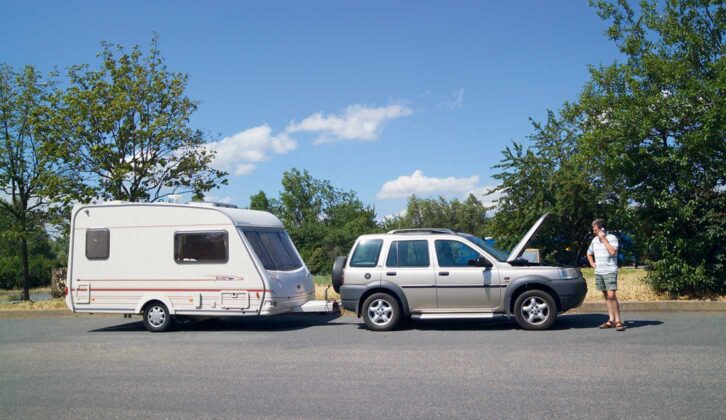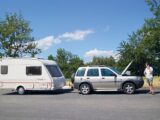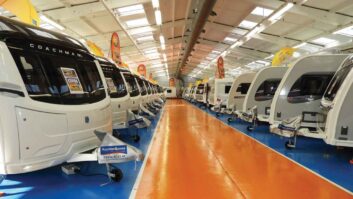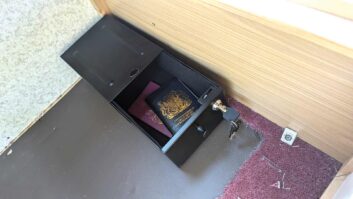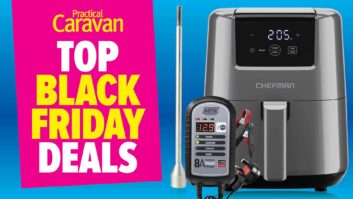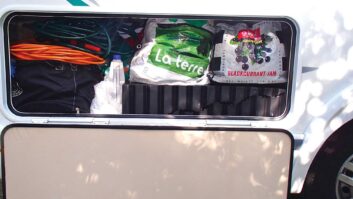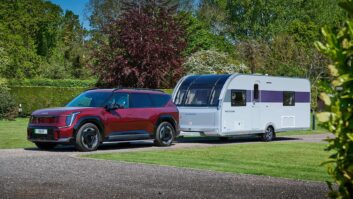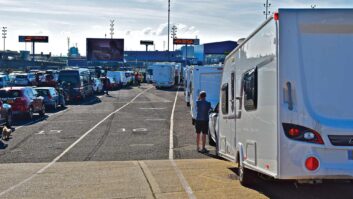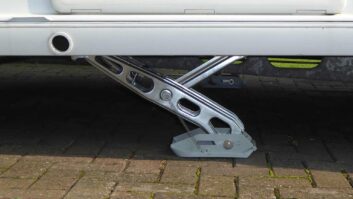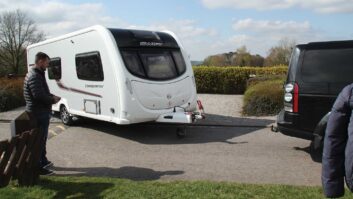It’s bad enough breaking down in your car at home, on holiday or, worse still, at the side of the road, but what would you do if it happens when you’re towing a tourer? Of course, these things do happen from time to time, so the best action you can take is be ready. That’s where having caravan breakdown cover comes in.
It’s something that can happen with even the best tow car. To help you prepare for this, we’re taking a look at some of the the main players in the caravan breakdown cover market, as well as answering some common questions, including what to do when you breakdown, options for pet owners, and cover for European tours.
You can quickly navigate to a particular area by clicking on a specific section in the list below.
Practical Caravan is supported by its audience. When you purchase through links on our site, we may earn an affiliate commission. Learn more
Caravan breakdown cover: what you need to know
What to do if your caravan breaks down
Choosing the caravan breakdown cover for you
Caravan breakdown cover for pet owners
Caravan breakdown cover for European tours
Finding a caravan breakdown cover provider
What to do if your caravan breaks down
There is never an ideal time to break down – throw in some wind and rain, and perhaps do it at night, on a busy road, with kids and a dog – before you know it, your leisurely trip to one of the best caravan parks has become a nightmare.
If you sense your tow car or tourer has developed a fault, turn on your hazard warning lights and make every effort to pull up somewhere safe, especially if you are on a motorway or a dual carriageway.
Try to get off the main road altogether, or at least into a layby. Hard shoulders and verges are dangerous places to be, but they are still better than stopping on the carriageway.
Pull over as far to the left as you can, without blocking the left-hand doors from opening.
If you stop on the hard shoulder or verge, turn your steering wheel to the left.
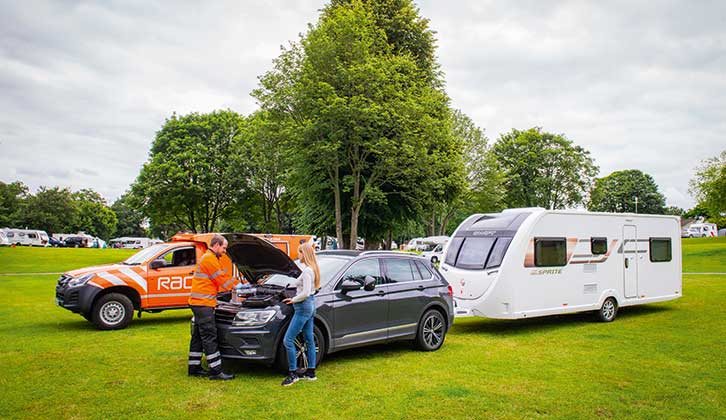
Emergency refuge
On smart motorways with no hard shoulder, try to get to an Emergency Refuge Area (ERA). Once there, try to pull up in the marked area, so that the recovery vehicle can access your tow car safely.
If your vehicle stops in a dangerous position on the road and won’t start, leave the lights on, switch on your hazard warning lights and, if safe to do so, get all occupants out on the verge/pavement side of the vehicle, as quickly as you can. Move them to a safe location, behind safety barriers if possible. They should also put on hi-vis vests as quickly as possible (these are one of the essential caravan accessories you should have to hand when touring), and wait in a position well away from, and behind, your tow car, in case it is struck by another vehicle.
If you’re not travelling on a motorway or a busy dual carriageway, observing the passing traffic carefully, position your warning triangle in a visible spot, at least 50m behind your outfit. (The AA provide details of safety kit to carry when travelling in Continental Europe, including warning triangles).
If your tow car is in a dangerous position, or visibility is poor, call the police before you contact the rescue services.
In a layby that’s not separated from the main carriageway, we’d be wary of remaining in the tow car or van while waiting for the breakdown patrol to arrive.
Unhitching the van
Likewise, take extreme care if you have to unhitch your tourer at the roadside, spending as little time as possible between caravan and tow car.
Ask someone to watch the oncoming traffic, so that you can step away if fast-moving HGVs or vans are passing, or there is any other potential danger.
If you get stuck in an ERA or on a smart carriageway, call the National Highways Regional Control Centre using the emergency phone – they’ll close the lane.
Apps such as Waze can inform other drivers of cars or obstructions in the road.
When you call your breakdown service, they will verify your details, confirm your location and the problem, and explain your options. They will also assess the urgency of your situation and prioritise you in their queue.
You may have a long wait for a patrol, especially if you are rated low risk. I’ve never waited less than 90 minutes, and once spent five hours at South Mimms Services with a blow-out.
The rescue services will need your contract number or vehicle registration, and your location. In most cases the latter is not an issue; out in the wilds, we would suggest using what3words.
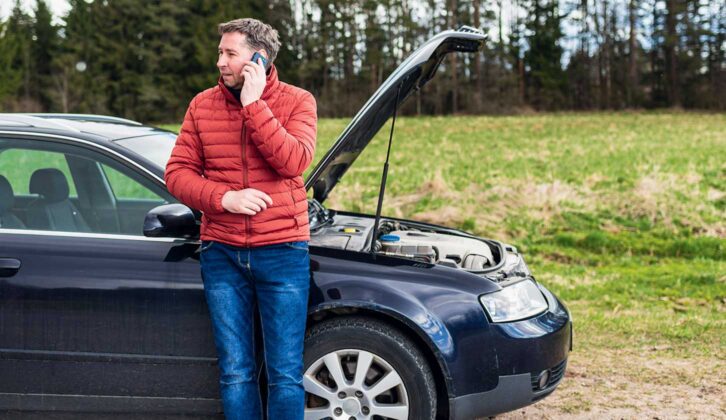
Have this information ready when you call, with as much detail as you can garner about what is wrong with the car or caravan. Of course, they need to know you are towing, so they can send an appropriate vehicle to recover your outfit, if the problem isn’t repairable.
If you want to know more about the initial hitching process, our guide to hitching up a caravan will explain all you need to know.
What to do when the rescue services arrive
Depending on your case, and your chosen rescue service and level of cover, you and your outfit could be recovered to a garage for repair, taken home, or transported to your holiday location. The better (more expensive) services might even put you up in a hotel while your vehicle is being repaired. If your tourer is badly damaged, it may be recovered by a caravan salvage business and stored safely until the insurance situation has been sorted out.
With my blow-out, by the time they arrived, all tyre workshops were closed, so I was taken home, then the next morning they came back and took my car to get the tyre replaced.
The more specialised types of cover that are provided by the caravan clubs are often better suited to dealing with broken-down outfits, and more likely to enable you to continue your holiday with a replacement tow car or some other solution.
Like any insurance policy, breakdown/recovery cover is something of a ‘distress purchase’ – a necessity, rather than a pleasure – but it’s far more distressing to find yourself without the correct level of cover if the worst does happen!
If you incur costs related to your incident, keep all of the receipts and details, because you might be able to reclaim these expenses.
Choosing the caravan breakdown cover for you
In the case of a breakdown or an accident, the best way to prepare is to buy yourself breakdown and recovery insurance.
Although money might be a bit tight right now, we recommend investing in the best cover you can afford. As packages come in all shapes and sizes, you should carefully read the small print to discover exactly what you’re purchasing, plus any exclusions or limitations on the policy.
For example, does it offer home start, will they recover your caravan (and if so, where to?), what happens if you’re at your holiday location at the time, and what is the coverage geographically?
All the recovery services insist that any tow car must be taxed and MOT tested, or the cover will be invalidated.
Breakdown cover is offered by a vast number of providers in the UK, but the actual recovery work is carried out by a smaller selection of organisations.
Of course, in this country, the RAC and the AA are the best known, and they have been perfecting the art of rescuing the Great British public for many years. Then there’s Green Flag, the new kid on the block, at just 50 years old.
Caravan breakdown cover for pet owners
If you regularly tour with pets, you’ll need to check with your breakdown/recovery provider what would happen to your animal in the event of any recovery situation.
In some circumstances, it might be necessary for you to cover the cost of pet transportation, if you are not keen on the idea of animals remaining in your broken-down vehicle while
it is being recovered by the service.
In response to a forum query about pets, Arrival states: “We would not cover the cost of any transportation, accommodation or care of any animal. If we provide onward transportation for you and the passengers of a vehicle, any animals that were in the vehicle can only be transported in the broken-down vehicle at your own risk.
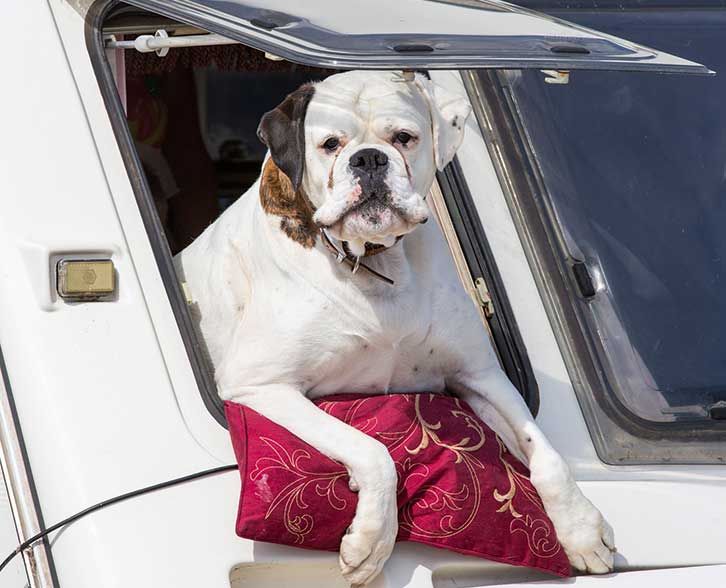
“We will not transport animals in the recovery vehicle and we will not be liable for, or insure, any animal during any onward transportation; however, any assistance animals must be transported with their owners.”
Don’t forget, if you’re after somewhere to head to with your canine companion for your next tour, our dog friendly caravan park guide is an ideal place to start.
Caravan breakdown cover for European tours
The Caravan and Motorhome Club, The Camping & Caravanning Club, the AA and several other suppliers provide cover for caravanners while touring in Europe.
The CAMC offering is called Red Pennant, while the C&CC’s Arrival service serves 49 countries.
European cover typically allows multiple trips in a year and features a 24/7 helpline with English-speaking operators, who are expert in solving problems when customers are touring on the Continent.
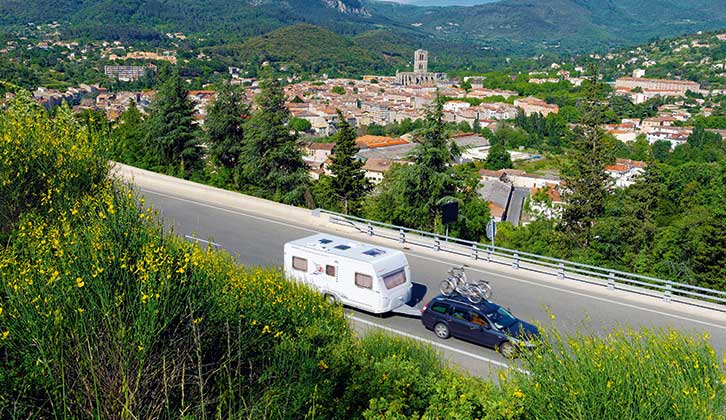
It guarantees to get your tow car, caravan and all occupants home if there is a major problem, such as an accident, irreparable mechanical failure, illness, injury or even death.
In fact, expert tow car drivers are on call to fly out to Europe and drive outfits back to the UK, should the driver be taken ill, or worse.
If your vehicle cannot be fixed at the roadside, Arrival will recover it to a local garage, and pay up to £150 towards labour costs. If it can’t be fixed within six hours, a hire car and hotel accommodation are provided.
Up to five trips a year are covered, and smaller incidents, for example, mis-fuelling, are also included.
Finding a caravan breakdown cover provider
For my own tow car, I tend to take out breakdown cover with my insurer each year. As the supplier changes most years, I make sure that I have an up-to-date note of the contact details and contract number in my glovebox, while also keeping the contact on my phone.
I do this religiously these days, after once spending a stressful hour beside the A5, trying to convince one operator that I had breakdown cover with them, before it finally dawned on me that I was actually with a different provider!
Here’s a quick overview of some of the main players in the roadside-rescue market.
Camping & Caravanning Club/RAC: Arrival
Arrival has been developed with The Camping & Caravanning Club, and includes specialist benefits for leisure vehicles. Non-members get a year’s free membership of the C&CC when they sign up to Arrival
The RAC was founded in 1897, 11 years after Carl Benz patented the first “vehicle powered by a gas engine”.
The organisation operates its own fleet of patrol vehicles and offers a wide range of services and levels of cover, including specialist options for caravans.
Cover generally starts 24 hours after signing up. If you’ve already broken down, you cannot use the online tool, but have to ring the RAC on 0330 159 8743.
They will still rescue you, but you may, understandably, pay a premium.
As with all of the breakdown/recovery services, there are a number of other elements to the cover, many of which are included free of charge. Standard RAC breakdown cover can also be upgraded to Arrival: visit the website for more details.
The AA
The AA operates its own fleet of patrol vehicles and provides a plethora of breakdown services, including options for ‘caravan plus tow car’ cover
The AA has more mobile mechanics than any other service and says it reaches most call-outs in under one hour.
Users can select Vehicle Cover (any driver is covered), or Driver Cover (the member is covered in any vehicle, even as a passenger). Tow cars and caravans must each be under 3.5 tonnes and no wider than 8ft 3in (excluding mirrors).
Caravan and Motorhome Club/Green Flag: Mayday
The Caravan and Motorhome Club and Green Flag offer three levels of nationwide breakdown cover
Of the three major suppliers, Green Flag scores the highest on Trustpilot, and has developed a bespoke service for leisure vehicles in conjunction with the CAMC.
The relationship has lasted for more than 40 years, during which time, the offering has evolved to match today’s touring habits and requirements. The Club says eight out of 10 caravanners choose to renew their cover annually.
Pre-Departure Caravan Cover means if your tourer breaks down shortly before your trip, this cover will pay to get it going again. Mayday doesn’t impose any special size, weight, or age restrictions, and there are unlimited call-outs, 24/7, 365 days a year. Caravan and tow car can also be taken to different locations within 75 miles of your home.
Other breakdown and recovery options
Take a look at our guide to the different caravan owners’ clubs too.
This article is based on information available in November/December 2022 and is intended as a general overview of common breakdown questions and issues. References to specific products are for illustration only and not intended as recommendation.
If you’ve enjoyed reading this article, why not get the latest news, reviews and features delivered direct to your door or inbox every month. Take advantage of our brilliant Practical Caravan magazine SUBSCRIBERS’ OFFER and SIGN UP TO OUR NEWSLETTER for regular weekly updates on all things caravan related.
